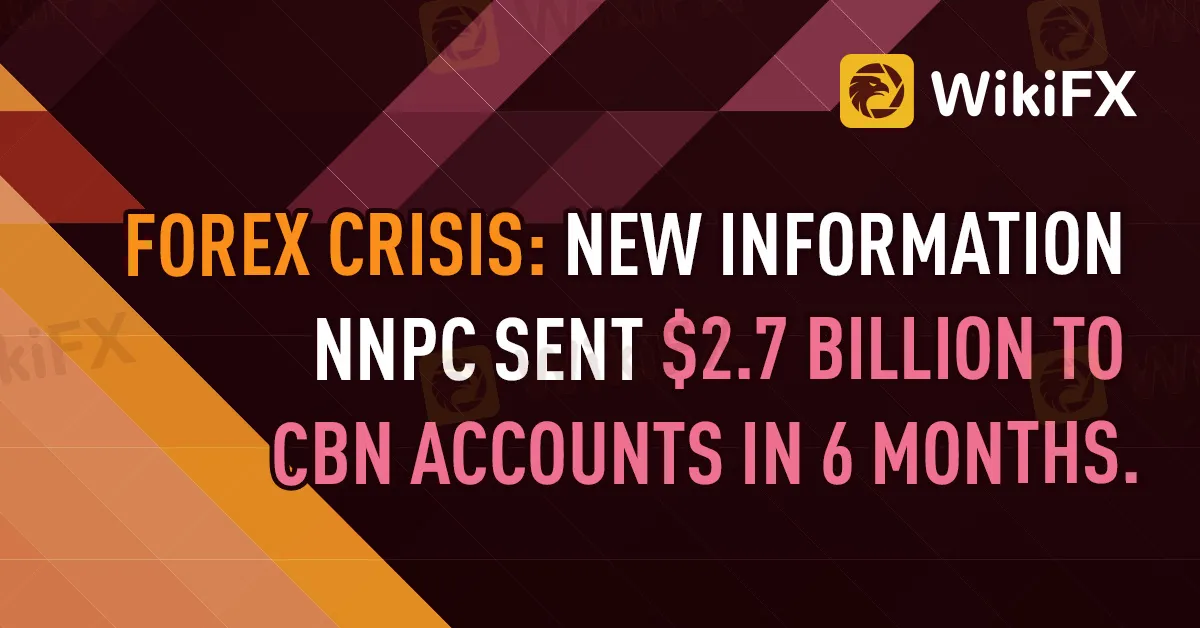简体中文
繁體中文
English
Pусский
日本語
ภาษาไทย
Tiếng Việt
Bahasa Indonesia
Español
हिन्दी
Filippiiniläinen
Français
Deutsch
Português
Türkçe
한국어
العربية
FOREX CRISIS: NEW INFORMATION NNPC SENT $2.7 BILLION TO CBN ACCOUNTS IN 6 MONTHS.
Abstract:Fresh information has shown that the Nigerian National Petroleum Company Ltd. remitted a total of $2.7 billion into its accounts with the Central Bank of Nigeria (CBN) between January and June this year, contrary to CBN's claim that foreign currency remittances were nonexistent, despite the Naira's value falling to an all-time low of N710 to the dollar last week.

Fresh information has shown that the Nigerian National Petroleum Company Ltd. remitted a total of $2.7 billion into its accounts with the Central Bank of Nigeria (CBN) between January and June this year, contrary to CBN's claim that foreign currency remittances were nonexistent, despite the Naira's value falling to an all-time low of N710 to the dollar last week.
In response to the recent naira free fall, the CBN said that the NNPC's failure to remit funds had caused the forex crisis.
The CBN stated there had been “zero-dollar remittances by the NNPC to the country's foreign reserve” in a paper titled “The forex question in Nigeria: Fact sheet.”
However, investigations have revealed that in the first half of this year, the NNPC Ltd. transferred $2.7 billion to the CBN. Records that were readily available also revealed that of the $2.7 billion that the NNPC transferred into its CBN accounts, $645 million was for a dividend paid by the Nigerian Liquefied Natural Gas Company Ltd., and the remaining $1.786 billion was for NNPC operations expenses.
According to a breakdown of the NNPC remittances, the following amounts were deposited in 2022: $18,770,418.97 in January, $194,563,276.49 in February, and $373,232,875.20 in March (March 2022).
Other NNPC payments included $247,884,295.52, $591,565,425.41, and $880,906,761.81 (all for April 2022). (June 2022).
Following the depreciation of the naira, CBN Governor Godwin Emefiele has been in the the controversy.
Emefiele was called before the Senate on Wednesday to provide an explanation for the declining value of the naira and to suggest a course of action.
In response to Senator Olubunmi Adetunmbi, the Senate not only called the head of the CBN to appear before it, but also instructed its Committee on Banking, Insurance, and Other Financial Institutions to carefully examine the intervention funds the CBN set aside to support certain economic sectors.
Senator Adetumbi said that a CBN earlier prohibition on forex sales to BDC operators led to a rise in exchange rates in his motion to summon Emefiele. He claimed that only a select few gains from the import-export window created to meet the FX requirements of commercial firms.
He claims that even the Personal Travel Allowance (PTA) and Business Travel Allowance (BTA) are inaccessible since the Central Bank of Nigeria (CBN) only covers less than 20% of the overall demand for foreign exchange made by tourists and companies.
Without accepting responsibility, the CBN has been attributing the fast decline in the value of the naira to a variety of causes.
Emefiele blamed the 2018 forex crisis on the importation of goods he said could have been produced in Nigeria, which led to the suspension of forex allocation for 41 goods.
Emefiele transferred the blame on Bureau De Change (BDC) employees in 2021, accusing them of engaging in illicit forex trading. He blamed “Aboki FX,” claiming that its operations reduced funding to BDC by causing the naira to depreciate.
The CBN has attributed the currency problem this year on politicians, money launderers who are purportedly supporting terrorists, but none of them have been able to stabilize the value of the naira.

Disclaimer:
The views in this article only represent the author's personal views, and do not constitute investment advice on this platform. This platform does not guarantee the accuracy, completeness and timeliness of the information in the article, and will not be liable for any loss caused by the use of or reliance on the information in the article.
Read more

Malaysian-Thai Fraud Syndicate Dismantled, Millions in Losses Reported
The Royal Malaysia Police (PDRM) has received 26 reports concerning the Nicshare and CommonApps investment schemes, both linked to a major fraudulent syndicate led by a Malaysian citizen. The syndicate’s activities came to light following the arrest of its leader by Thai authorities on 16 December.

WikiFX Review: Is FxPro Reliable?
Founded in 2006, FxPro is a reputable UK-based broker, trading on various market instruments. In this article, we will help you find the answer to one question: Is FxPro reliable?

Top 10 Trading Indicators Every Forex Trader Should Know
Master the top 10 Forex trading indicators to analyze real-time Forex quotes, trends, and market signals. Learn strategies to boost accuracy and avoid mistakes.

WikiEXPO Global Expert Interview: Simone Martin—— Exploring Financial Regulation Change
In the midst of financial innovation and regulation, WikiGlobal, the organizer of WikiEXPO, stays abreast of industry trends and conducts a series of insightful and distinctive interviews on pivotal topics. We are delighted to have the privilege of inviting Simone Martin for an in-depth conversation this time.
WikiFX Broker
Latest News
ASIC Sues Binance Australia Derivatives for Misclassifying Retail Clients
Top 10 Trading Indicators Every Forex Trader Should Know
WikiFX Review: Is FxPro Reliable?
Malaysian-Thai Fraud Syndicate Dismantled, Millions in Losses Reported
Trading frauds topped the list of scams in India- Report Reveals
WikiFX Review: Something You Need to Know About Markets4you
Revolut Leads UK Neobanks in the Digital Banking Revolution
Fusion Markets: Safe Choice or Scam to Avoid?
SEC Approves Hashdex and Franklin Crypto ETFs on Nasdaq
Malaysian Pensioner Loses RM823,000 in Fake Investment Scam
Currency Calculator


